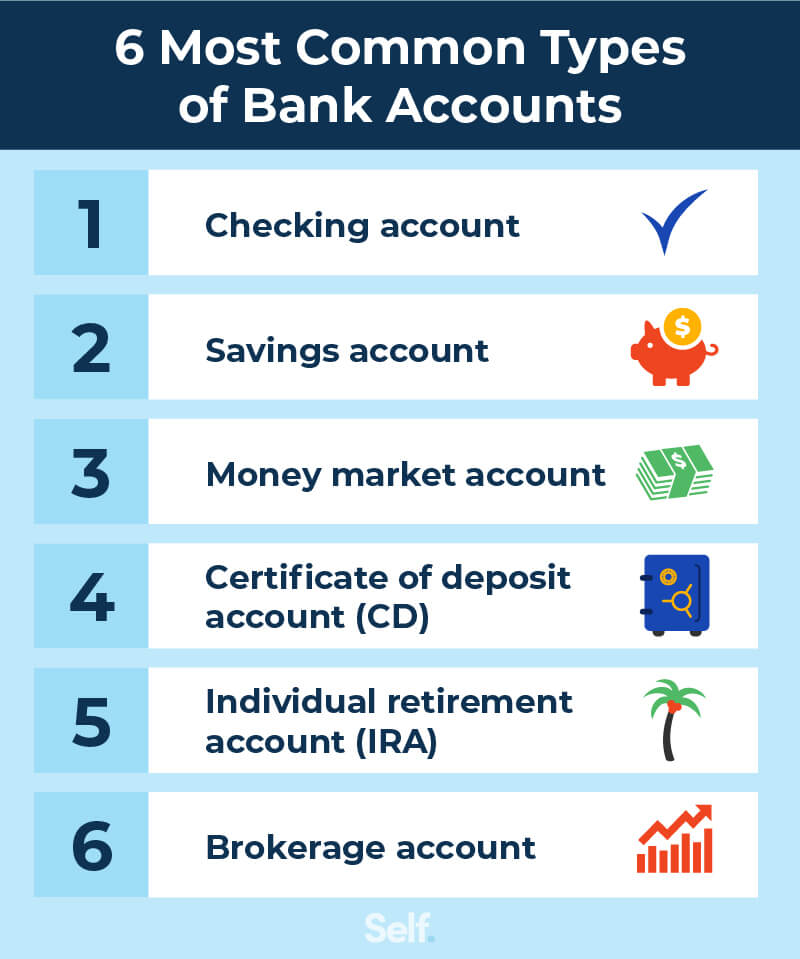
What are the 6 different bank accounts
What are the different types of bank accountsChecking accounts. A checking account, simply put, is the type of bank account you're probably most familiar with.Savings accounts.Money market accounts.Certificates of deposit (CDs)Retirement accounts.Brokerage accounts.
What are the 4 most common types of bank accounts
The most common types of bank accounts include:Checking accounts.Savings accounts.Money market accounts (MMAs)Certificate of deposit accounts (CDs)
What are the best types of bank accounts
High-yield savings accounts—typically found at online banks, neobanks and online credit unions—are savings accounts that offer a higher APY compared to regular savings accounts. This is one of the best types of savings accounts to maximize your money's growth.
What are the classification of bank accounts
What Are Four Types of Bank AccountsChecking Account. Think of a checking account as your “everyday account.” It's a place to keep the money you use to pay your bills or cover everyday expenses.Savings Account.Money Market Account.Certificate of Deposit (CD)
What are the 5 basic accounts
The 5 primary account categories (also called real accounts) are as follows:Assets.Liabilities.Equity.Expenses.Income (Revenue)
What are the 5 major types of accounts
In general, there are 5 major account subcategories: revenue, expenses, equity, assets, and liabilities.
What are the 5 major types of accounts and explain each account
In general, there are 5 major account subcategories: revenue, expenses, equity, assets, and liabilities. A business transaction will fall into one of these categories, providing an easily understood breakdown of all financial transactions conducted during a specific accounting period.
What is the most popular type of bank account
Checking Account. The most basic type of bank account is the checking account. Think of it as home base. For most people, it's where their paycheck gets deposited, where bills get paid from, and where they keep the money they need to get to quickly.
What account is best for saving
If you're looking for the best savings deal, here's a quick rundown of the top interest rates on accounts at the moment:Easy-access savings account: 4.51%Notice savings account: 5.35%One year fixed-term bond: 6.15%Sharia savings account: 6.01%Regular savings account: 7%
What are the 5 major classification of accounts
The 5 primary account categories (also called real accounts) are as follows:Assets.Liabilities.Equity.Expenses.Income (Revenue)
What are 4 fundamentals of accounts
o Trial Balance.o Profit and Loss Account.o Balance Sheet.o Cash-Flow Statement.
What are the 5 major accounts and meaning
These can include asset, expense, income, liability and equity accounts. You may use each account for a different purpose and maintain them on your financial ledger or balance sheet continuously.
What are the 12 types of accounting
In this article, we'll cover:Financial Accounting.Cost Accounting.Auditing.Managerial Accounting.Accounting Information Systems.Tax Accounting.Forensic Accounting.Fiduciary Accounting.
What are the 4 financial accounts
ContentsBalance sheet.Income statement.Cash flow statement.Statement of owner's equity.
What is the most secure type of bank account
Savings accounts are a safe place to keep your money because all deposits made by consumers are guaranteed by the Federal Deposit Insurance Corporation (FDIC) for bank accounts or the National Credit Union Administration (NCUA) for credit union accounts.
What are the top 5 major accounts
The 5 primary account categories are assets, liabilities, equity, expenses, and income (revenue)
What is the safest account to save money
The safest places to save money include a savings account, certificate of deposit (CD) or government-backed securities. The best options may be those that provide higher earnings than traditional savings accounts but also provide a balance of liquidity and stability.
What are the top 5 savings accounts everyone should have
5 Savings Accounts Everyone Should Have.Emergency Account.Vacation Account.Retirement Account.Freedom Account.Large Purchases Account.
What are the three main types of accounts
3 Different types of accounts in accounting are Real, Personal and Nominal Account. Real account is then classified in two subcategories – Intangible real account, Tangible real account. Also, three different sub-types of Personal account are Natural, Representative and Artificial.
What are the 5 major accounts in accounting
In general, there are 5 major account subcategories: revenue, expenses, equity, assets, and liabilities.
Which country is safest to open a bank account
Switzerland
Switzerland. Switzerland is synonymous with offshore banking thanks to its long-standing reputation for safety and privacy. In fact, Switzerland has a sophisticated and diverse banking system that's regarded as one of the best in the world, plus a strong and stable currency and economy.
Which type of bank account is best for everyday
Checking account: A checking account offers easy access to your money for your daily transactional needs and helps keep your cash secure. Customers can typically use a debit card or checks to make purchases or pay bills.
What 4 accounts should we have all have
Some experts suggest you should have four bank accounts — two checking and two savings. You'll use one checking account to pay bills and the other for spending money. One savings account will be dedicated to your emergency fund and the other to miscellaneous goals.
What account is better than a savings account
A money market account (MMA) is another savings account alternative that typically restricts withdrawals to six per month. While MMAs sometimes have higher interest rates than savings accounts, they may also require a higher minimum balance to open and maintain.
What are the 10 branches of accounting
The ten branches of accounting include the following:Financial Accounting.Management accounting.Cost Accounting.Tax accounting.Auditing.Accounting information systems.Forensic accounting.Fiduciary accounting.


